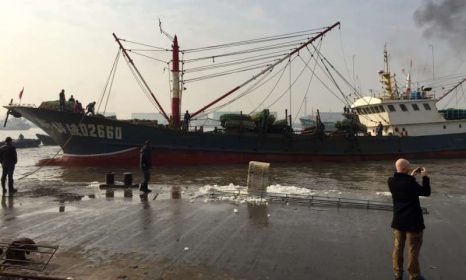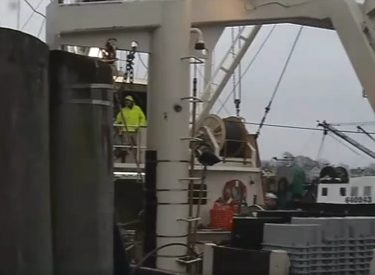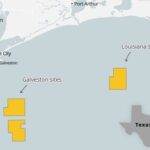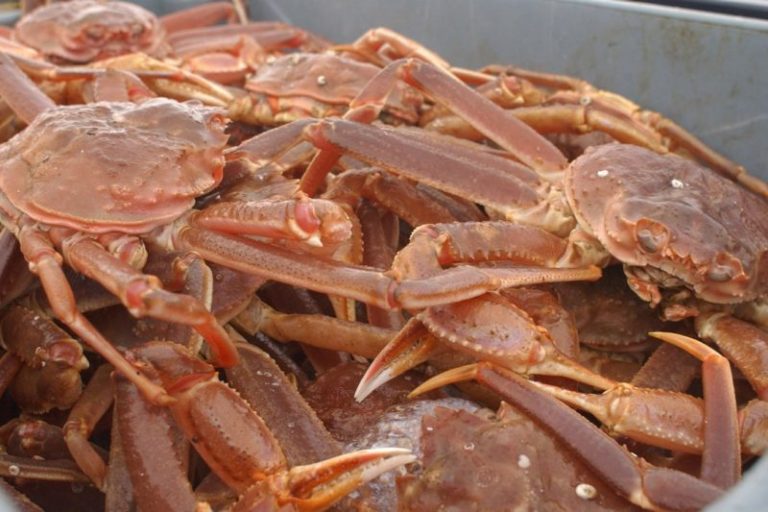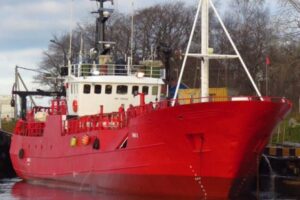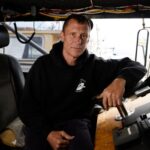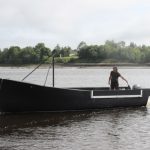Daily Archives: January 19, 2017
Haddock Boom! The number of haddock believed to have survived their first year off N.S. is “extraordinary,” says biologist
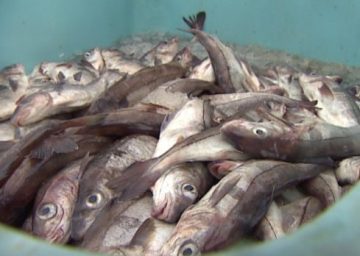 Exactly how many of the haddock that hatched in 2013 are still swimming off the coast of southern Nova Scotia is not certain, but researchers agree the numbers are potentially massive. Biologist Monica Finley recently completed a population assessment for the southern Scotian Shelf and Bay of Fundy. She estimates 264 million haddock were hatched there in 2013 and survived their first year, making it an “extraordinary” year-class. “This 2013 year-class is five times higher than the next highest on record since 1985,” said Finley, who works at a Department of Fisheries and Oceans research facility in St. Andrews, N.B. Her report predicts 100,000 metric tonnes of haddock will reach adulthood in 2017 and 2018. On Georges Bank, the population is predicted to be even bigger, with Canadian and American scientists estimating the 2013 hatch at 1.3 billion fish. Read the story here 18:36
Exactly how many of the haddock that hatched in 2013 are still swimming off the coast of southern Nova Scotia is not certain, but researchers agree the numbers are potentially massive. Biologist Monica Finley recently completed a population assessment for the southern Scotian Shelf and Bay of Fundy. She estimates 264 million haddock were hatched there in 2013 and survived their first year, making it an “extraordinary” year-class. “This 2013 year-class is five times higher than the next highest on record since 1985,” said Finley, who works at a Department of Fisheries and Oceans research facility in St. Andrews, N.B. Her report predicts 100,000 metric tonnes of haddock will reach adulthood in 2017 and 2018. On Georges Bank, the population is predicted to be even bigger, with Canadian and American scientists estimating the 2013 hatch at 1.3 billion fish. Read the story here 18:36
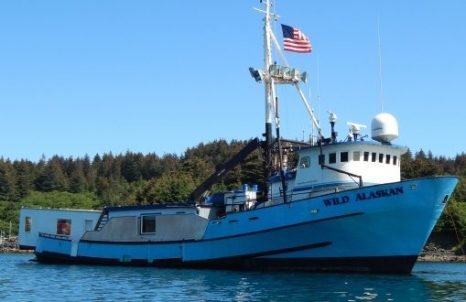
Sentencing reset for “Wild Alaskan” owner
A sentencing hearing has been rescheduled in the case of an Alaska man who was found guilty of illegally dumping human waste into a harbor while operating a crabbing boat that had been converted into a floating strip club. Darren Byler had been scheduled for a Thursday sentencing. But his attorney, John Cashion, says Byler’s flight from Kodiak Island was delayed and the sentencing is now set for 3:30 p.m. Friday. Federal prosecutors are recommending that Byler be sentenced to 18 months imprisonment. Prosecutors say Byler piped raw sewage from bathrooms aboard the 94-foot “Wild Alaskan” into the harbor near Kodiak in 2014 instead of taking it 3 miles offshore. The Bylers were accused of telling the Coast Guard they were properly disposing of the waste. click to read the rest 16:54
Sweden not giving up fight over lobster import ban
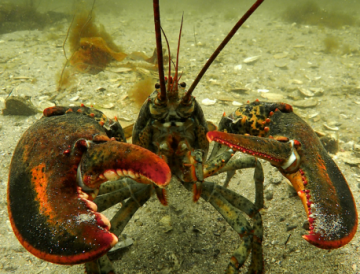 Sweden isn’t giving up on a long-running battle with the U.S. and Canada over lobsters that have turned up in Swedish waters. Officials with Sweden told The Associated Press that their country is working on a new proposal about how to deal with American lobsters that have turned up. A controversy about whether American lobsters are invasive in Swedish waters has simmered for almost a year. Sweden had wanted the European Union to consider a ban of imports of American lobsters. That call came after Sweden announced it had found 32 American lobsters in its waters. European Union officials turned away that request in October after American and Canadian scientists and politicians raised concerns about a lack of evidence that the lobsters warranted such a sweeping ban. But Swedish officials told the AP that the country remains concerned that American lobsters could interfere with European lobsters, which have economic value. Read the story here 15:09
Sweden isn’t giving up on a long-running battle with the U.S. and Canada over lobsters that have turned up in Swedish waters. Officials with Sweden told The Associated Press that their country is working on a new proposal about how to deal with American lobsters that have turned up. A controversy about whether American lobsters are invasive in Swedish waters has simmered for almost a year. Sweden had wanted the European Union to consider a ban of imports of American lobsters. That call came after Sweden announced it had found 32 American lobsters in its waters. European Union officials turned away that request in October after American and Canadian scientists and politicians raised concerns about a lack of evidence that the lobsters warranted such a sweeping ban. But Swedish officials told the AP that the country remains concerned that American lobsters could interfere with European lobsters, which have economic value. Read the story here 15:09
A ‘Confluence of events’ may have caused mysterious fish kill off Nova Scotia
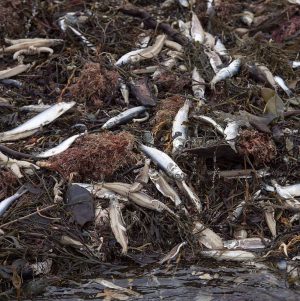 A federal scientist says the recent high-profile fish kill off southwestern Nova Scotia may have been caused by a “confluence of events,” including fish behaviour, weather, and various ecological factors such as predators. However, Alain Vezina says it’s still not known what caused thousands of herring and shellfish to wash ashore at several points between late November and through December. Vezina, who is regional director of science for the Department of Fisheries and Oceans (DFO), says causes such as pollution, pesticides, and naturally occurring toxins have been ruled out. He says overall the kill was a “small and localized event” that occurred over a 100 kilometre swath from St. Marys Bay to Tusket. Read more here 14:47
A federal scientist says the recent high-profile fish kill off southwestern Nova Scotia may have been caused by a “confluence of events,” including fish behaviour, weather, and various ecological factors such as predators. However, Alain Vezina says it’s still not known what caused thousands of herring and shellfish to wash ashore at several points between late November and through December. Vezina, who is regional director of science for the Department of Fisheries and Oceans (DFO), says causes such as pollution, pesticides, and naturally occurring toxins have been ruled out. He says overall the kill was a “small and localized event” that occurred over a 100 kilometre swath from St. Marys Bay to Tusket. Read more here 14:47
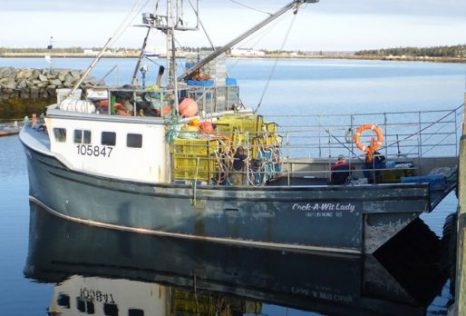
TSB Canada urges Fishermen to run safety drills in wake of tragic death investigation – New rules coming
The Transportation Safety Board of Canada says the crew on board a Nova Scotia fishing boat could have done more to prepare for potential emergencies, and that lack of planning may have played a role in the death of one of their own. Keith Stubbert, a 53-year-old man fisherman from Cape Breton, was dragged overboard from the Cock-a-Wit Lady and died during the first day of lobster season in southwestern Nova Scotia on Nov. 30, 2015. In a report released Thursday, the safety board said the crew of the ship hadn’t ever conducted safety drills and didn’t have a system for on-board risk management, such as meetings to identify safety risks. Transport Canada’s new fishing vessel safety regulations will come into force July 13, 2017. Under these rules small fishing boats will be required to have written safety procedures and familiarize all people on board with those procedures. The regulations also require safety drills be performed, including how to rescue someone who falls overboard. Records are to be kept of every drill, said the Transportation Safety Board. Read the story here 14:10
Alaska’s Senators push Trump nominees to guard fisheries, rural areas while cutting regulations
Alaska Sens. Lisa
 Murkowski and Dan Sullivan pressed Cabinet nominees to consider Alaska’s uniqueness, the difficulties of rural areas and the nation’s largest fisheries at a spate of confirmation hearings this week. Senators can publicly question President-elect Donald Trump’s Cabinet selections when they sit on the committee holding a confirmation hearing. Several of those nominees faced controversy and opposition from Democrats. Hallways were packed with supporters and protesters Wednesday in a Senate office building where three hearings were happening simultaneously. Murkowski pressed her nominees on how they would adjust some their conservative stances to meet her needs for rural and Native populations in Alaska. Sullivan focused on the state’s fishing industry. Both urged peeling back regulations they said are onerous and often a barrier to economic growth or healthy public services. Read the article here 11:29
Murkowski and Dan Sullivan pressed Cabinet nominees to consider Alaska’s uniqueness, the difficulties of rural areas and the nation’s largest fisheries at a spate of confirmation hearings this week. Senators can publicly question President-elect Donald Trump’s Cabinet selections when they sit on the committee holding a confirmation hearing. Several of those nominees faced controversy and opposition from Democrats. Hallways were packed with supporters and protesters Wednesday in a Senate office building where three hearings were happening simultaneously. Murkowski pressed her nominees on how they would adjust some their conservative stances to meet her needs for rural and Native populations in Alaska. Sullivan focused on the state’s fishing industry. Both urged peeling back regulations they said are onerous and often a barrier to economic growth or healthy public services. Read the article here 11:29
Connecticut’s fishing fleet facing potentially ‘disastrous’ quota cuts for fluke
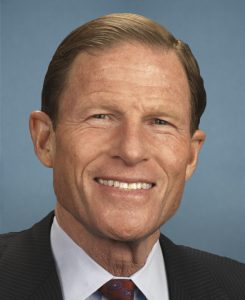 “It’s going to put us out of business,” Stonington fisherman Robert Guzzo, vice president of the Southern New England Fishermen and Lobstermen’s Association, said Wednesday. “I’ve never seen so many fish in the ocean. The fish are out there, but the science and the regulators haven’t caught up with what’s actually out there.” On Wednesday, U.S. Sen. Richard Blumenthal, D-Conn., pressed commerce secretary nominee Wilbur Ross to use his authority to change how quotas for fish species including fluke — also called summer flounder — are allocated among states from the mid-Atlantic to New England. In response, Ross said he is interested in helping the fisheries and ensuring quotas are allocated properly. The Department of Commerce includes the National Marine Fisheries Service. Blumenthal’s statements during the hearing came a day after he and U.S. Sen. Chris Murphy, D-Conn., and U.S. Rep. Joe Courtney, D-2nd District, sent a letter to the current commerce secretary urging that the new quotas be withdrawn. Read the story here 10:30
“It’s going to put us out of business,” Stonington fisherman Robert Guzzo, vice president of the Southern New England Fishermen and Lobstermen’s Association, said Wednesday. “I’ve never seen so many fish in the ocean. The fish are out there, but the science and the regulators haven’t caught up with what’s actually out there.” On Wednesday, U.S. Sen. Richard Blumenthal, D-Conn., pressed commerce secretary nominee Wilbur Ross to use his authority to change how quotas for fish species including fluke — also called summer flounder — are allocated among states from the mid-Atlantic to New England. In response, Ross said he is interested in helping the fisheries and ensuring quotas are allocated properly. The Department of Commerce includes the National Marine Fisheries Service. Blumenthal’s statements during the hearing came a day after he and U.S. Sen. Chris Murphy, D-Conn., and U.S. Rep. Joe Courtney, D-2nd District, sent a letter to the current commerce secretary urging that the new quotas be withdrawn. Read the story here 10:30
Commerce Secretary Declares Fisheries Disasters for Nine West Coast Species
 The US Secretary of Commerce Penny Pritzker has determined there are commercial fishery failures for nine salmon and crab fisheries in Alaska, California and Washington. In recent years, each of these fisheries experienced sudden and unexpected large decreases in fish stock biomass due to unusual ocean and climate conditions. This decision enables fishing communities to seek disaster relief assistance from Congress. Read the story here 09:54
The US Secretary of Commerce Penny Pritzker has determined there are commercial fishery failures for nine salmon and crab fisheries in Alaska, California and Washington. In recent years, each of these fisheries experienced sudden and unexpected large decreases in fish stock biomass due to unusual ocean and climate conditions. This decision enables fishing communities to seek disaster relief assistance from Congress. Read the story here 09:54
Sen. Sheldon Whitehouse Mentions RI Fishermen During Pruitt Hearings
 U.S. Sen. Sheldon Whitehouse quizzed President-elect Trump’s nominee for Administrator of the Environmental Protection Agency about his support for Rhode Island fishermen. During Senate hearins today, Whitehouse asked Oklahoma Attorney General Scott Pruitt if “he would support the fishing and aquaculture industries in the face of climate change, and whether he would protect Rhode Islanders from out-of-state polluters.” “As we discussed when you and I met, the oceans off our Ocean State are warming due to fossil fuel-driven climate change,” said Whitehouse. Read the rest here 08:12
U.S. Sen. Sheldon Whitehouse quizzed President-elect Trump’s nominee for Administrator of the Environmental Protection Agency about his support for Rhode Island fishermen. During Senate hearins today, Whitehouse asked Oklahoma Attorney General Scott Pruitt if “he would support the fishing and aquaculture industries in the face of climate change, and whether he would protect Rhode Islanders from out-of-state polluters.” “As we discussed when you and I met, the oceans off our Ocean State are warming due to fossil fuel-driven climate change,” said Whitehouse. Read the rest here 08:12






